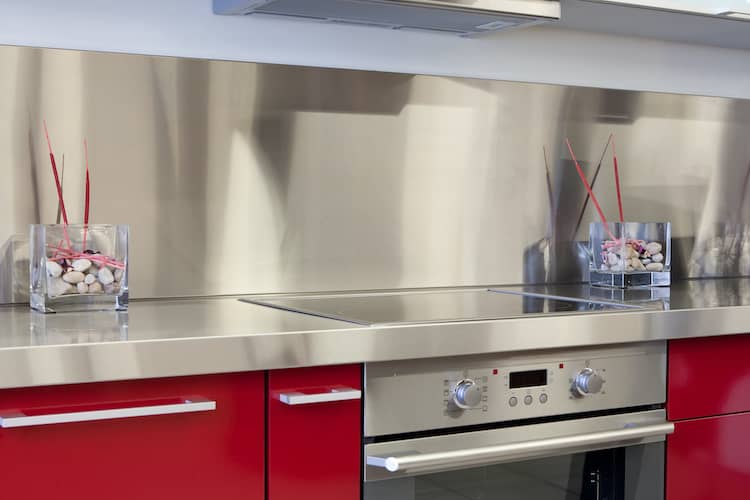How to Care for Countertop Surfaces
Follow this guide to learn more about the different types of countertops and how to care for countertop surfaces.
We rarely think about how much we use the surfaces in our home. Your kitchen counter, for example, is more than the area where you cook. It’s where your kids toss their backpacks, where you unload groceries, where you pile up and read the mail.
Kitchen counters see a lot of action. That’s in addition to all the crumbs, spills, and splatters they take as you cook.
Doing a nightly wipedown to tidy countertops up will help maintain it, but each different type of surface requires special cleaning from time-to-time. Here’s how you can care for countertop surfaces, no matter what type you have.
Proper care for countertop surfaces
While properly maintaining a countertop surface will make sure it lasts longer, a clean kitchen is also healthier. Keeping your countertops, in both kitchens and bathrooms, dirt-free helps keep the bacterial buildup under control.
This in turn means surfaces have less chance of needing harsh, germ-killing chemicals to maintain cleanliness. “Humans aren’t immune to the biological effects of strong anti-bacterial agents, and keeping your home clean using safe practices can be challenging,” according to Sara Elliott of How Stuff Works. “Maintaining a regular cleaning regimen keeps bacteria under control, so there’s less of it to deal with.”
Clean countertops will also inspire you to maintain the cleanliness in the rest of your kitchen (and bathroom). Spending a little time each day tidying up can help reduce clutter and germs in two rooms of the house that get a lot of use.
Cleaning by surface type
Everyone has different preferences when it comes to the surface of their counters. Each material has its own pros, cons, and special cleaning instructions. Make sure you know how to properly care for countertop surfaces to keep them lasting as long as possible.
—
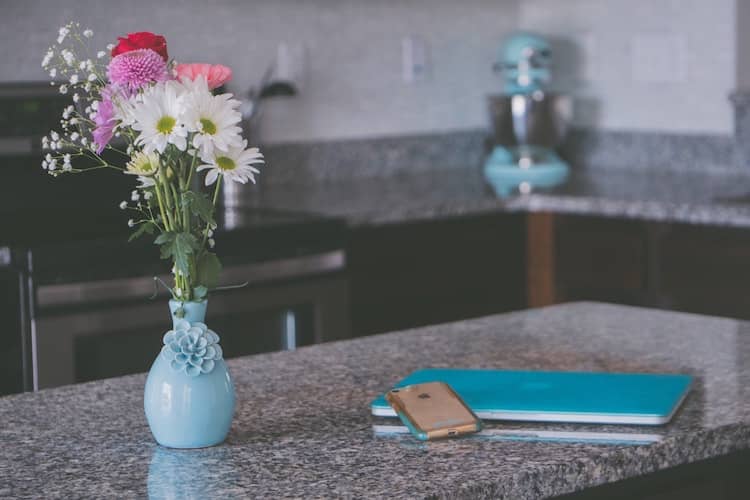
Granite
It’s hard to find anything boomers and millennials agree on these days, but one place they come together is in their preference for granite countertops. According to a survey, conducted by the National Association of Home Builders, 62 percent of millennials, and 53 percent of boomers, prefer granite counters in their home. Even with conflicting instructions on how to care for this material, granite still reigns supreme.
The first tip, avoid windex. It will get your granite counter clean, but can wear away at the sealant. For daily care, you can purchase a granite cleaning spray that makes the job easy. All you have to do is spray and wipe each night after you’re done in the kitchen. Make sure the cleaner is for granite though, and doesn’t contain any ammonia or bleach.
Gentle dish soap, warm water, and a microfiber cloth will also get the job done if you’d rather use what’s already available at home. Again, the key is to avoid harsh cleaners since they break down the sealant on the granite faster.
There’s no set timetable for resealing your granite counters, but it’s part of regular maintenance to check it out. You can do this with only a few drops of water left on your counter for about five minutes. If, after that time, the water is still there, your counter is effectively sealed. If the water is gone, because your granite absorbed it, time to re-apply.
—
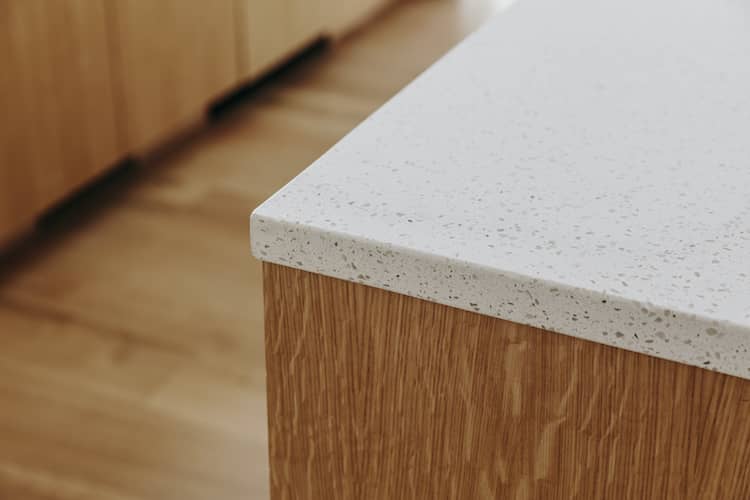
Quartz
The best thing about quartz is that, unlike granite, it’s not porous. You don’t have to seal it or worry about your countertop cleaner scratching it up. You also have less risk of mildew and bacteria since there aren’t any cracks or chips where dirt can hide.
Quartz can stain though. When this happens, try soap and water first. If that doesn’t do the trick, use a glass cleaner and soft sponge for quick removal. Quartz is a pretty stain-resistant material, so you might not have to resort to any extra elbow grease to keep it clean.
There’s no sealing involved with quartz and caring for it only requires you to clean it periodically with soap and water. It’s super easy.
—
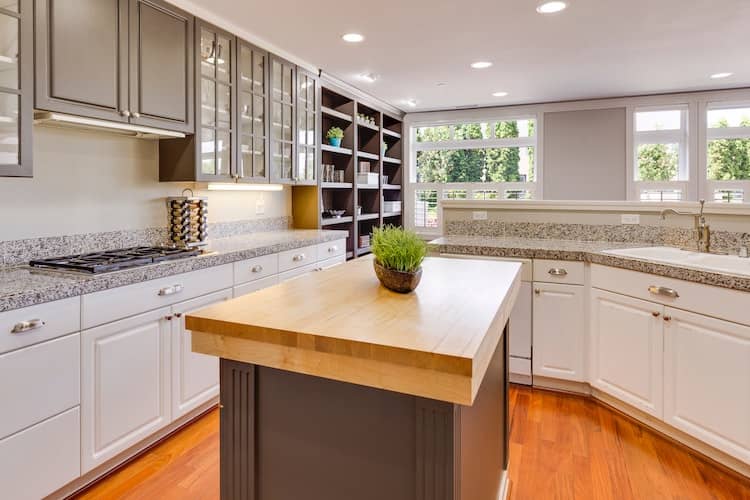
Butcher Block
This countertop requires a lot of care. One drop of the wrong liquid and you’ve got an unsightly stain that won’t go away without a lot of effort. You have to use it carefully.
Even regular cleaning involves a few extra steps when compared with other surfaces.
- Scrape off any stuck-on food or residue with a metal pastry scraper or spatula.
- Scrub the countertop using mild dish soap, hot water, and a sponge. When done, take a second wipe-down pass with just water.
- Spray white vinegar onto the countertop for a sanitizing finish. Wipe clean after a few minutes with a damp cloth.
Always make sure to thoroughly dry your countertop with a kitchen towel after cleaning. Leaving the butcher block wet can lead to staining and damage.
To give your butcher block a makeover, oil it. You only have to do this when you want your countertop to shine a little brighter, but each oiling helps condition the wood. Use a food-safe option like mineral oil, or, for the shiniest results, try a combination of mineral oil and beeswax.
—
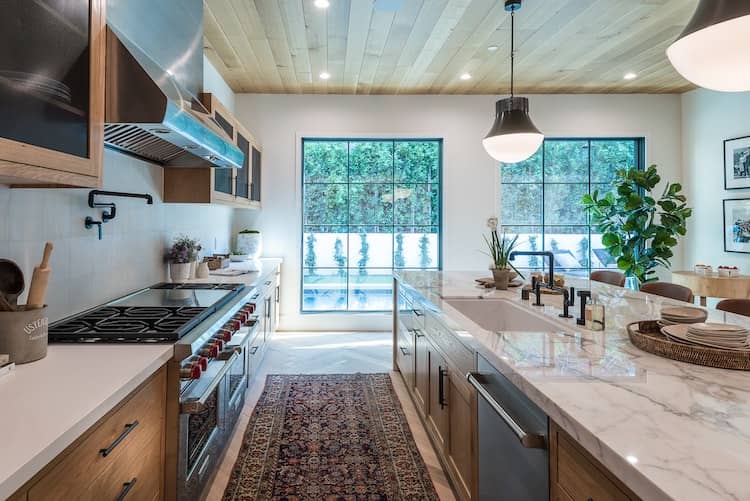
Marble
Another countertop surface that succumbs to stains, marble is extremely easy to clean. A quick, daily wipe, and you’re good to go. Use something non-abrasive and non-acidic to keep the surface smooth. Opt for mild dish soap once again and a towel.
If staining does appear, don’t stress. You can take it out without relying on harsh chemicals. Combine water and baking soda until it has the consistency of paste. Spread over the stain and let it sit for at least a day before wiping it away.
—
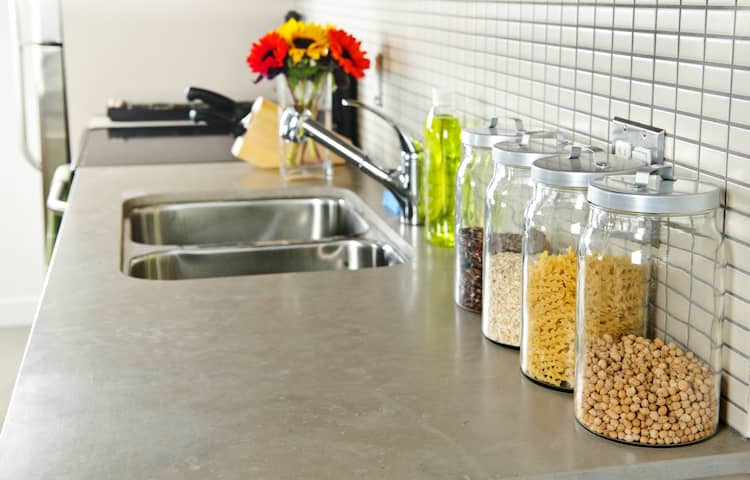
Soapstone
Resistant to stains and scratches, soapstone is yet another countertop surface that can get a quick, regular clean with a non-abrasive, multi-purpose cleaner and cloth. Just a few quick sprays each night, one careful wipe, and you’re done.
The same cleaner should even remove most stains. However, if you get a tough one, you can etch it out with very fine sandpaper. After, apply a layer of mineral oil to the spot to keep the area smooth.
—
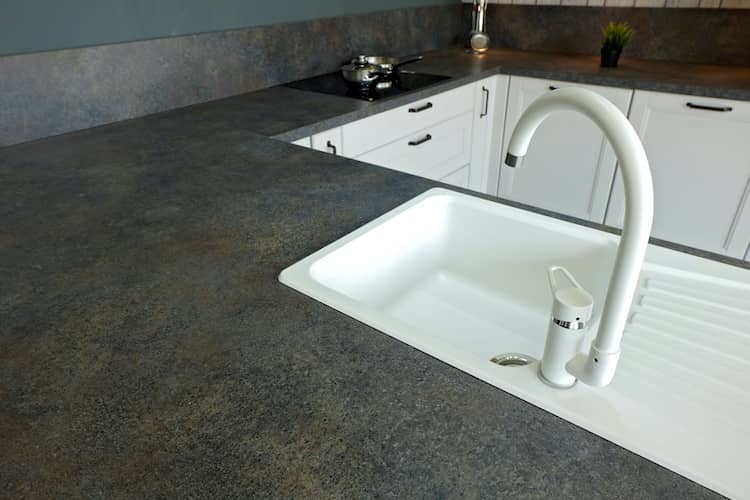
Laminate
Once thought to be the ‘uncool’ countertop choice in kitchens, laminate has made a bit of a comeback. It looks better, feels different, and can even trick someone into thinking your countertop surface is a material it isn’t. If you’ve upgraded your counters to today’s stylish laminate, it’s yet another material that’s easy to clean.
For regular care, give laminate counters a daily wipe with a non-abrasive cleaner. Make sure to address spills right away to prevent staining. If your laminate has a texture to it, you can use a gentle scrub brush to clean out the nooks and crannies.
—
Stainless Steel
More common in commercial kitchens, you might see stainless steel in some homes. Especially if you’ve outfitted the space for a chef, you could find yourself maintaining this type of countertop.
Regular care is easy, but stainless can scratch and stain. It also shows smudges and streaks more clearly than most other surface materials. Frequent soap-and-water wipe downs will keep you on top of most issues. A microfiber cloth and stainless steel cleaner will help get out more stubborn marks.
Take care of stains with the same baking soda paste that works on marble, only don’t leave it on for a day. With stainless, you can rub off with a soft cloth pretty quick.
—
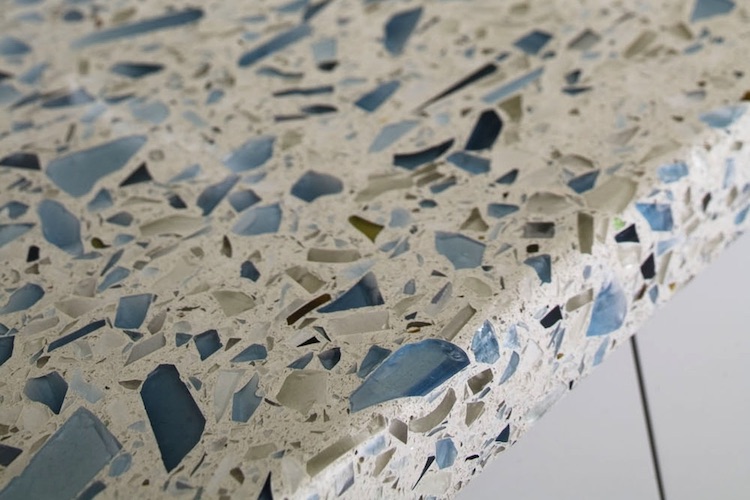
Recycled Glass
For those with sustainability on their mind, a recycled glass countertop might be the best choice. These countertops not only keep glass out of landfills, but allow for a highly customized look.
Care is very simple. Recycled glass counters only need a daily wipe with a damp, soft cloth. For a deeper cleaning, swap the water for a mild cleaner, and you’re good to go. Any cleaning products need to be free of acids such as bleach, ammonia, and citric acid.
Consider using placemats, coasters, and trivets for anything going on top of your recycled glass counters to minimize the risk of scratching.
Care for countertop surfaces is only part of kitchen upkeep
Whether you move into a home with a high-end countertop, or decide to do some kitchen renovations on your own, it’s important to know how to properly care for your counters. The right care keeps your counters lasting longer.
However, if you’re living in a house where the kitchen and its counters could use some love, it’s not always in the budget to make upgrades. If you’re ready to sell your home, but it’s in less-than-perfect condition, not to worry. Working with Sundae lets you get a fair price for your home without having to struggle with putting it on the market.
Ready to Get Started?
Sell as-is. Pay zero fees to Sundae. Move on your time. No repairs, cleanings, or showings.

